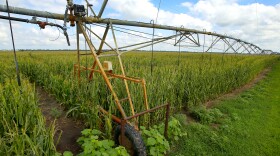 Biosecurity Research Institute provides upper-level training for students working with transboundary animal diseases Tuesday, March 7, 2017 Program fellows Fellows in the transboundary animal diseases training program don scrubs and protective outerwear in a teaching laboratory at the Biosecurity Research Institute at Kansas State University. From left are Laura Constance, Christopher Holderman, Christian Rittmann, Victoria Ayers and Rachel Palinski.
Biosecurity Research Institute provides upper-level training for students working with transboundary animal diseases Tuesday, March 7, 2017 Program fellows Fellows in the transboundary animal diseases training program don scrubs and protective outerwear in a teaching laboratory at the Biosecurity Research Institute at Kansas State University. From left are Laura Constance, Christopher Holderman, Christian Rittmann, Victoria Ayers and Rachel Palinski.
Credit Kansas State University
Kansas State University is teaching students emergency response in foreign animal disease situations – something a recent graduate of Texas A&M University is taking advantage of.
As The Topeka Capital-Journal reports, Brianna Willis graduated from Texas A&M with a bachelor’s degree in animal science and plans to pursue a master’s in epidemiology – the branch of medicine that deals with the incidence, distribution, and possible control of diseases and other factors relating to health but after completing a six-week internship at K-State’s Biosecurity Research Institute, she sees the importance of incorporating emergency planning into her plans.
Ken Burton, program director of the National Agricultural Biosecurity Center, located on the K-State campus, said most emergency personnel in rural communities are volunteers and the Animal Disease Response Training program offers training similar to that of Willis’s through a one-day program that helps nontraditional animal disease first responders understand their roles in emergency situations.






